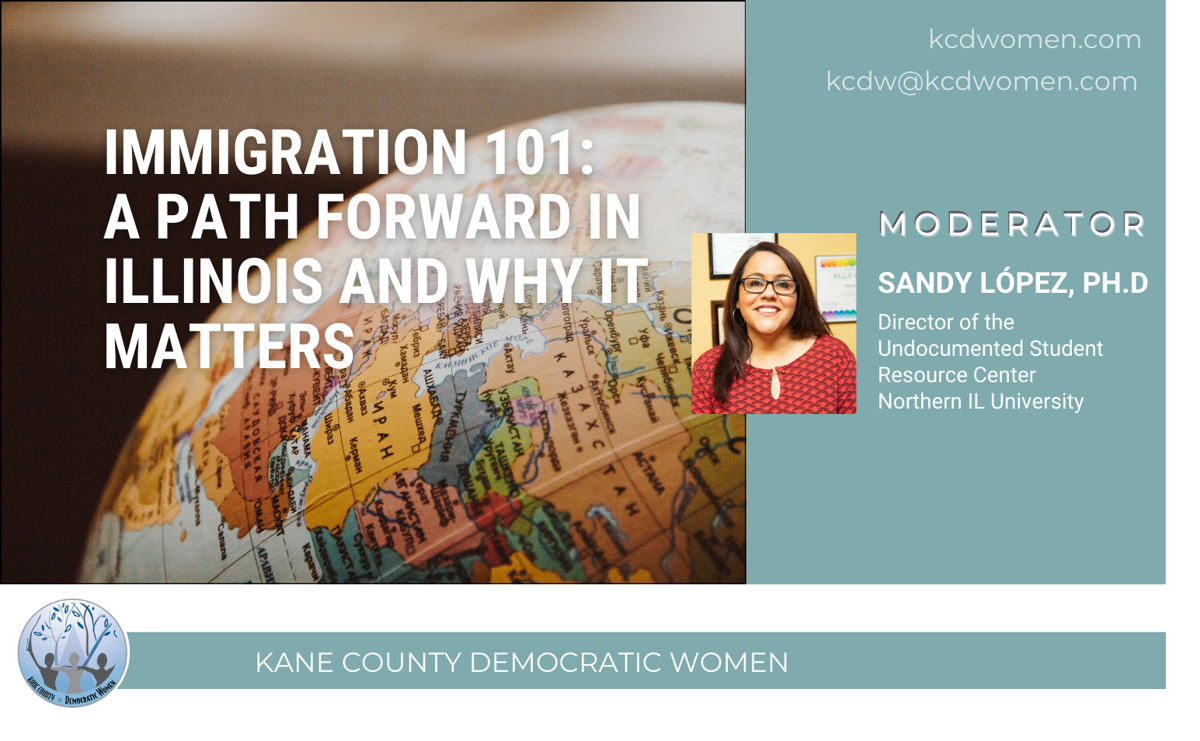byline: Editorial Writer Linda Willet
The Kane County Democratic Women conducts forums several times a year to bring the community together to discuss current issues and ask questions from people who are working on those issues. A recent forum entitled “Immigration 101: A Path Forward in Illinois and Why It Matters” was held on July 20, 2024, at the Geneva Public Library. Dra. Sandy López, who has assisted Latino students, staff, and faculty for over 30 years, introduced the panelists and showed a short video about the history of immigration
At the beginning of the forum, Marlén Romero Garcia, an immigration attorney in Elgin, stated that it is important to use the correct terms when talking about immigration issues. We often hear the term “illegal immigrants” in daily conversations and the news media. The correct term is “undocumented immigrants,” which means immigrants that are in the U.S. without legal immigration status. Marlén reported that we also hear negative comments about immigrants without hearing the factual information, much of which is positive. For example, one-third of the physicians and surgeons in the U.S. are immigrants. In the metal and plastics industries that are essential to our economy, 43% of the employees are immigrants. And immigrants spend $51 billion every year and pay $20 billion in taxes.
Marlén Garcia and Farah Chalisa, an attorney who specializes in employment discrimination and human rights litigation discussed the effects of the IIRIRA Bill, which was introduced in the video. Before the 1990s, many immigrants went back and forth between Mexico and the U.S. Some were working in essential agricultural jobs and returned home when those jobs were completed after the harvest. In 1996, the IIRIRA Bill was passed, which made it easy to deport all immigrants, even those with green cards. They can be deported for minor offenses, such as traffic tickets, without seeing a judge. With the IIRIRA Bill, it also became harder for immigrants to become documented. Before IIRIRA, immigrants who had been in the U.S. for seven years could become documented if they showed they would suffer “extreme hardship” if deported. Now an immigrant who is undocumented and has been here for 10 years has to show that a U.S. citizen such as the immigrant’s child or spouse would suffer hardship if the immigrant is deported.
Presently, an immigrant who entered the U.S. legally and overstayed a visa may obtain a green card if the immigrant marries a U.S. citizen. However, if an immigrant entered the U.S. without documentation and has lived in the U.S. for six months, the rules are much different. The immigrant has to leave the U.S. for 3 years. If the immigrant has lived in the U.S. for a year or more, the immigrant has to leave for 10 years. This is known as the 3- and 10-year bars. These bars have resulted in millions of immigrants remaining undocumented when they would have been eligible to apply for citizenship before the 1996 bill was passed. Fortunately, a provisional waiver is available in some cases “to maintain family unity.” Other hurdles include the high costs to apply for citizenship and various permits such as work permits, travel permits, and naturalization applications.
There are various ways to become a citizen. The U.S. issues visas for family members who meet certain guidelines. And employers can apply for visas for skilled workers. Refugees and asylum seekers can also apply for admission based on five protected grounds. Refugees must apply while outside of the U.S., usually in a country they fled to when seeking protection from persecution. Asylum seekers can be in the U.S. or at a port of entry.
There is some good news. Resources are available in Kane County and DuPage County, and Illinois is one of the more welcoming states. Dianha Orgeta-Ehreth, Executive Director of Centro de Información in Elgin, talked about some of the programs offered there. Centro provides financial assistance to families in crisis and offers employment and healthcare information. It is a safe place where immigrants can meet with bilingual and bicultural counselors. Often immigrants are afraid to share information with people they meet. They don’t know who they can trust. There are weekly seminars, and immigrants are encouraged to take ESL classes and attend workshops. Immigration counselors are also available for immigrants who want to know the process to become documented.
Maya Piña, Director at Casa Michoacan Elgin, talked about the importance of accepting people and being kind to them. Casa is dedicated to promoting the welfare and empowerment of the Latinx community in Cook County and Kane County. It is an official Illinois Welcoming Center that offers mental health programs, photography workshops for youth, financial literacy information, ESL classes, cultural events, art exhibitions, and a film club.
Dra. Sandy López concluded the forum by emphasizing the importance of immigration reform. As we know, a recent bipartisan bill passed the House but was rejected in the Senate. The bill would have brought some relief, but major changes are needed. We can talk to our representatives about the needed legislation. Most of all, we can support welcoming centers that help immigrants. If we all work together with our legislators, significant changes can be made.

